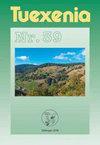保加利亚西北部山区的干燥草原:对多样性、生态学和分类学的首次见解
IF 1.1
4区 生物学
Q3 PLANT SCIENCES
引用次数: 45
摘要
我们介绍了欧洲干草原集团(EDGG)第三次研究考察的数据,该考察于2011年在保加利亚西北部山区的两个对比区进行。目的是收集小区数据,以便在分类学和生物多样性方面将保加利亚的干草原与欧洲其他地区的干草原进行比较。我们选取了15个巢状样地系列(0.0001-100 m²)和68个正常样地(10 m²),覆盖了Vratsa地区(巴尔干山脉)和Koprivshtitsa地区(Sredna Gora山脉)的各种干草地类型。在样地内测定了所有维管植物、陆生非维管植物以及一套土壤和其他环境参数。通过改进TWIN-SPAN,我们在关联水平上区分了10种植物区系特征较好的植被类型。通过与欧洲和地区文献的比较,我们将其划分为3纲5目:Festuco-Brometea与Stipo pulcherrimae-Festucetalia pallentis(富基岩石的干旱草原)目;高山木属,羽状短足植物属(中干性,嗜碱草地);与花萼花亚目花萼花亚目花萼花亚目花萼花亚目花萼花亚目花萼花亚目花萼花亚目花萼花亚目花萼花亚目的花萼花亚目花萼花亚目的花萼花亚目(低地至山地花萼花亚目)的联盟;和Koelerio-Corynephoretea与Sedo-Scleranthetalia目(富骨架的酸性土壤开放群落);联盟不明)和Trifolioarvensis-Festucetalia ovinae(封闭、中干旱、嗜酸草原;联盟Armerio rumelicae-Potentillion)。在保加利亚首次报道了具有羊蹄草-矢状genistelletum关联的Violion caninae,而出现的两个Koelerio-Corynephoretea群落为新关联(Cetrario aculeatae-Plantaginetum radicae, Plantagini radicae - agrostietum capillaris)。根据DCA,主要的区系梯度在很大程度上取决于土壤条件,区分了高pH和高腐殖质含量土壤上的Festuco-Brometea群落和酸性,腐殖质贫瘠土壤上的Koelerio-Corynephoretea群落,而Calluno-Ulicetea是连接环节。在10 m²面积上,Festuco-Brometea和Calluno-Ulicetea林分在所有被调查分类群和维管植物种类上都比Koelerio-Corynephoretea林分丰富;后者以地衣种类最为丰富,而苔藓植物的丰富度在不同的分型间差异不显著。在保加利亚的群落中,Festuco-Brometea群落的种区关系最陡峭(即β多样性最高),但α和β多样性均明显落后于位于研究区以北不到500 km的罗马尼亚特兰西瓦尼亚高原的Festuco-Brometea群落。总的来说,我们的研究有助于保加利亚干草原在欧洲分类系统中的更充分的位置,并为大规模的生物多样性模式分析提供了有价值的数据本文章由计算机程序翻译,如有差异,请以英文原文为准。
Dry grasslands of NW Bulgarian mountains: first insights into diversity, ecology and syntaxonomy
We present the data of the 3rdresearch expedition of the European Dry Grasslands Group (EDGG), which was conducted in 2011 in two contrasting areas in NW Bulgarian mountains. The aim was to collect plot data for comparing Bulgarian dry grasslands with those of other parts of Europe in terms of syntaxonomy and biodiversity. We sampled 15 nested-plot series (0.0001–100 m²) and 68 normal plots(10 m²) covering the full variety of dry grassland types occurring in the Vratsa area (Balkan Mts.) and the Koprivshtitsa area (Sredna Gora Mt.). In the plots all vascular plants, terricolous non-vascular plants and a set of soil and other environmental parameters were determined. By applying modified TWIN-SPAN, we distinguished 10 floristically well characterised vegetation types at the association level. After comparison with the regional and European literature, we propose to place them within three classes and five orders: Festuco-Brometea with the orders Stipo pulcherrimae-Festucetalia pallentis (xerophilous dry grasslands of base-rich rocks; alliance Saturejion montanae), Brachypodietalia pinnate (meso-xeric, basiphilous grasslands; alliances Cirsio-Brachypodion pinnate and Chyrsopogono grylli-Danthonion calycinae),Calluno-Ulicetea with the order Nardetalia stricae (lowland to montane Nardus swards; alliance Violion caninae), and Koelerio-Corynephoretea with the orders Sedo-Scleranthetalia (open communities of skeleton-rich, acidic soils; alliance unclear) and Trifolioarvensis-Festucetalia ovinae(closed, meso-xeric, acidophilous grasslands; alliance Armerio rumelicae-Potentillion). The Violion caninae with the association Festuco rubrae-Genistelletum sagittalisis reported from Bulgaria for the first time, while the two occurring Koelerio-Corynephoretea communities are described as new associations (Cetrario aculeatae-Plantaginetum radicatae, Plantagini radicatae-Agrostietum capillaris). According to DCA the main floristic gradient was largely determined by soil conditions, differentiating the Festuco-Brometea communities on soils with high pH and high humus content from the Koelerio-Corynephoretea communities on acidic, humus-poor soils, while the Calluno-Ulicetea stands are the connecting link. At 10 m² Festuco-Brometea and Calluno-Ulicetea stands were richer in species across all investigated taxa and in vascular plants than Koelerio-Corynephoretea stands; the latter were richest in lichen species, while bryophyte richness did not differ significantly among syntaxa. Among the Bulgarian classes, the species-area relationships tended to be steepest in the Festuco-Brometea (i.e. highest beta diversity), but both alpha and beta diversity clearly fell behind the Festuco-Brometea communities in the Transylvanian Plateau, Romania, located less than 500 km north of the study region. Overall, our study contributes to a more adequate placement of the Bulgarian dry grasslands in the European syntaxonomic system and provides valuable data for large-scale analyses of biodiversity patterns
求助全文
通过发布文献求助,成功后即可免费获取论文全文。
去求助
来源期刊

Tuexenia
PLANT SCIENCES-
CiteScore
2.80
自引率
25.00%
发文量
0
期刊介绍:
Tuexenia publiziert Original- und Übersichtsarbeiten sowie Berichte zu Themen der Geobotanik / Vegetationsökologie und zu Nachbarwissenschaften wie Populationsökologie, Biodiversitätsforschung, Biozönologie, Renaturierungsökologie und ihren Anwendungen, vor allem im Naturschutz. Der geografische Schwerpunkt liegt in Zentraleuropa und angrenzenden Regionen.Tuexenia erscheint jährlich in einem Band, der etwa zur Jahresmitte fertig gestellt wird. Autoren erhalten von jeder Arbeit eine PDF-Datei und gemeinsam 20 Sonderdrucke kostenlos.
Die Qualität der wissenschaftlichen Manuskripte wird durch die Redaktion und einen Wissenschaftlichen Beirat (Peer Review) gesichert (s. auch die Manuskript-Richtlinien vor dieser Seite). Es werden keine Druckkosten erhoben. Tuexenia legt Wert auf allgemeine Online-Verfügbarkeit der Beiträge.
 求助内容:
求助内容: 应助结果提醒方式:
应助结果提醒方式:


